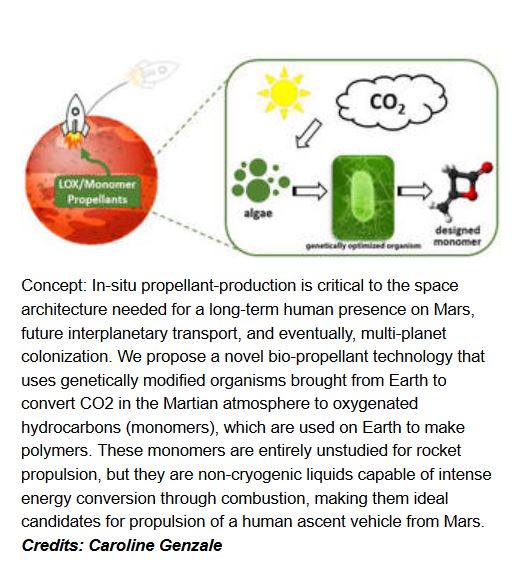 |
| Prof. Caroline Genzale |
 |
| Prof. Wenting Sun |
Georgia Tech Aerospace Engineering professor Wenting Sun will be collaborating with colleagues from the colleges of Engineering and Science on a NASA-funded project to develop a renewable, liquid, storage-stable rocket propellant that can be produced and burned on Mars.
“Fueling a Human Mission to Mars” is the name of the multidisciplinary project, one of 16 that were recently funded through NASA's 2020 Innovative Advanced Concepts (NIAC) program. The nine-month investigation will be led by School of Mechanical Engineering professor Caroline Genzale who will be working with Sun and Pamela Peralta-Yahya, an associate professor in the School of Chemistry and Biochemistry.
The NASA Innovative Advanced Concepts (NIAC) Program actively solicits ideas that are capable of transforming future NASA missions with radically better or entirely new aerospace concepts. NIAC projects deliver technically credible, advanced concepts from the collaborative research of diverse entrepreneurs and non-traditional sources.
 |
Together, the Georgia Tech team will develop technology that will use bio-organisms to perform atmospheric in-situ resource utilization (ISRU) to produce a propellant entirely from Mars resources. The aim is to reduce the Entry Descent Landing (EDL) mass of a crewed mission to Mars by approximately 7 tons by eliminating the need to transport, land, and store rocket propellant for the return launch. This technology will also enable long-term human presence on Mars and beyond because repeated costly propellant deliveries from Earth would be unnecessary.
“I’m really interested in the idea of designer biofuels,” said Genzale.
“Combustion is has fallen out of favor lately due to carbon emissions, but liquid fuels are extremely valuable energy-dense resources. Current fuels used for combustion and propulsion are based on naturally-occurring resources, but they are not necessarily optimal for combustion efficiency or for controlling the types of pollutants formed, and they do not utilize renewable sources of carbon. Biofuel synthesis can not only leverage renewable carbon resources, but we now have an exciting opportunity to tailor the physiochemical properties of a fuel for optimal performance as a high-efficiency clean combustion energy source.”
Added Sun:
”Biofuel synthesis is not new. But synthesis of fuel tailored for rocket propulsion and available resource on Mars is a bold and creative idea. We never thought about burning monomers before but their properties fit Mars environment perfectly.”
The plan calls for the genetic engineering of organisms to efficiently convert the abundant CO2 in the Martian atmosphere into liquid hydrocarbons suitable for rocket propulsion and other energy needs on Mars. The proposed system grows algae biofilms that consume atmospheric CO2 and sunlight with minimal water resources. The algae would then provide a food source to the genetically optimized organisms engineered to produce a monomer with ideal combustion behavior and liquid properties.
The monomers would serve as fuel in a propellant combination to power a human-crewed Mars Ascent Vehicle (MAV). The chemical and physical properties and energy density of these monomers suggest that they are capable of sufficient energy conversion through combustion for a crewed launch from Mars, making them excellent candidates for an ISRU rocket propellant. They are also liquid over a wide range of typical Mars temperatures, making them non-cyrogenic and storage stable.
The oxygen atoms in the designed monomer will also enable a cleaner burn than conventional hydrocarbon propellants, supporting the reuse of rocket engines for multi-mission and interplanetary trips.
The group’s approach will test the thermo-physical-chemical properties and combustion behavior of a suite of monomer rocket propellant candidates, while simultaneously developing the biological system for synthesizing them on Mars. By working together and in parallel, the collaborators will efficiently integrate testing feedback to quickly arrive at a co-optimized ISRU monomer rocket propellant.
In theory these advantages will reduce infrastructure and resources needed to support human missions to Mars, and could lead to more ambitious efforts to expand human presence throughout the solar system.